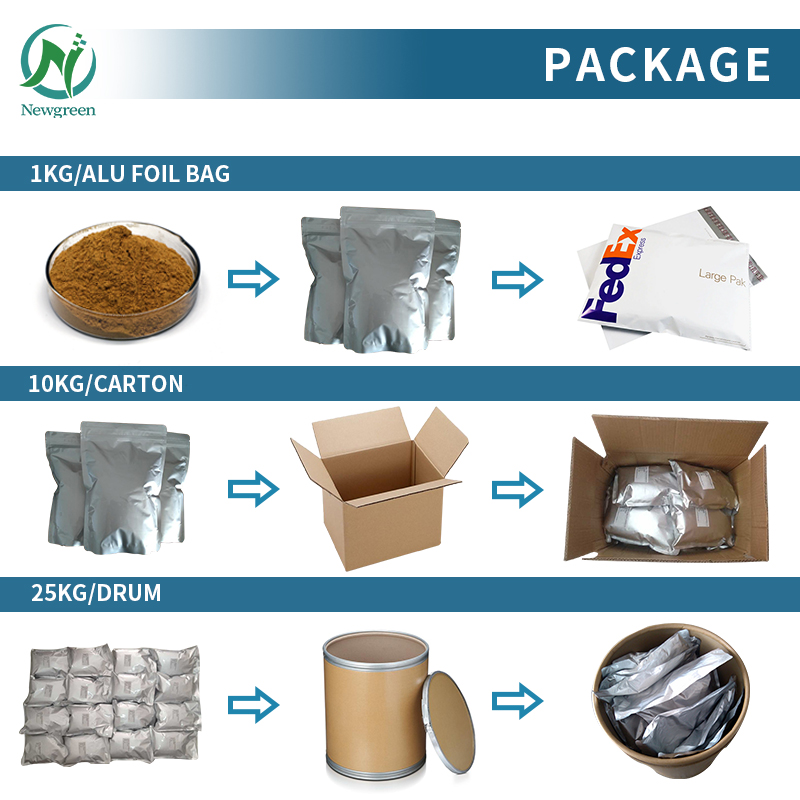Sorbitol Newgreen Supply Food Additives Sweeteners Sorbitol Powder

Product Description
Sorbitol is a low-calorie sugar alcohol compound,It is widely distributed in pears, peaches and apples, the content is about 1% to 2%, and it is the reduction product of hexose hexitol, a non-volatile polysugar alcohol, It is often used in food as a sweetener, loosening agent and moisturizing agent.
White hygroscopic powder or crystalline powder, flake or granule, odorless; It is marketed in liquid or solid form. Boiling point 494.9℃; Depending on the crystallization conditions, the melting point varies in the range of 88~102℃. The relative density is about 1.49; Soluble in water (1g soluble in about 0.45mL water), hot ethanol, methanol, isopropyl alcohol, butanol, cyclohexanol, phenol, acetone, acetic acid and dimethylformamide, slightly soluble in ethanol and acetic acid.
Sweetness
Its sweetness is about 60% of sucrose, which can provide moderate sweetness in food.
Heat
Sorbitol has low calories, about 2.6KJ/g, and is suitable for people who need to control their caloric intake.
COA
| Appearance | White crystalline powder or granule | Conform |
| Identification | The RT of the major peak in the assay | Conform |
| Assay(Sorbito),% | 99.5%-100.5% | 99.95% |
| PH | 5-7 | 6.98 |
| Loss on drying | ≤0.2% | 0.06% |
| Ash | ≤0.1% | 0.01% |
| Melting point | 88℃-102℃ | 90℃-95℃ |
| Lead(Pb) | ≤0.5mg/kg | 0.01mg/kg |
| As | ≤0.3mg/kg | <0.01mg/kg |
| Count of bacteria | ≤300cfu/g | <10cfu/g |
| Yeast & Molds | ≤50cfu/g | <10cfu/g |
| Coliform | ≤0.3MPN/g | <0.3MPN/g |
| Salmonella enteriditis | Negative | Negative |
| Shigella | Negative | Negative |
| Staphylococcus aureus | Negative | Negative |
| Beta Hemolyticstreptococcus | Negative | Negative |
| Conclusion | It is conformed with the standard. | |
| Storage | Store in cool & dry place not freeze, keep away from strong light and heat. | |
| Shelf life | 2 years when properly stored | |
Functions
Moisturizing effect:
Sorbitol has good moisturizing properties and can help the skin retain moisture. It is often used in skin care products and cosmetics.
Low Calorie Sweeteners:
As a low-calorie sweetener, sorbitol is suitable for use in sugar-free or low-sugar foods to help control calorie intake.
Promote digestion:
Sorbitol can act as a laxative, helping relieve constipation and promote intestinal health.
Blood sugar control:
Due to its low glycemic index, sorbitol is suitable for diabetics and has less impact on blood sugar.
Thickener:
In some foods and cosmetics, sorbitol can be used as a thickening agent to improve the texture and mouthfeel of the product.
Antibacterial Properties:
-Sorbitol has antimicrobial effects in some cases, helping to extend the shelf life of foods.
Application
Food Industry:
Low-sugar and sugar-free foods: As a low-calorie sweetener, it is commonly used in candies, chocolates, beverages, baked products, etc.
Hydrating Agent: In some foods, sorbitol can help retain moisture and improve taste.
Cosmetics and Personal Care Products:
Moisturizer: widely used in facial creams, lotions, facial cleansers and other products to help maintain skin moisture.
Thickener: used to improve the texture and feel of the product.
Medicine:
Pharmaceutical Preparations: As a sweetener and humectant, it is often used in the preparation of certain drugs, especially liquid drugs and syrups.
Laxatives: Used in medicines to treat constipation to help promote bowel movement.
Industrial Application:
Chemical Raw Materials: used in the production of other chemicals and synthetic materials.
Related Products

Package & Delivery



















